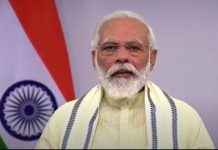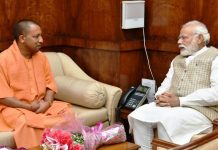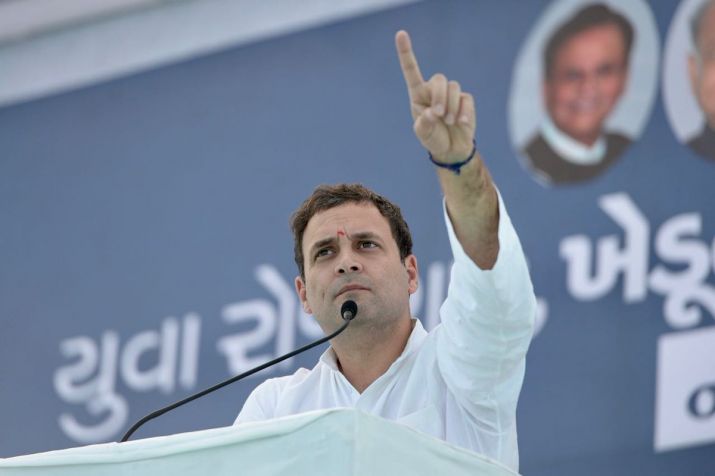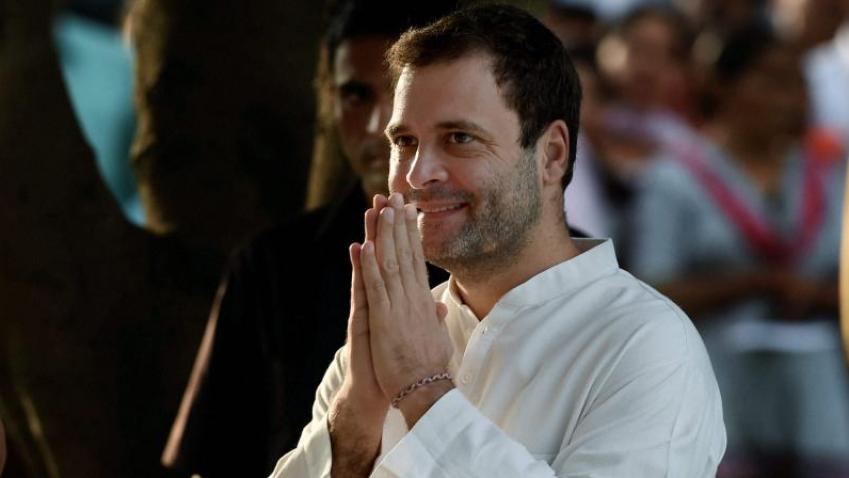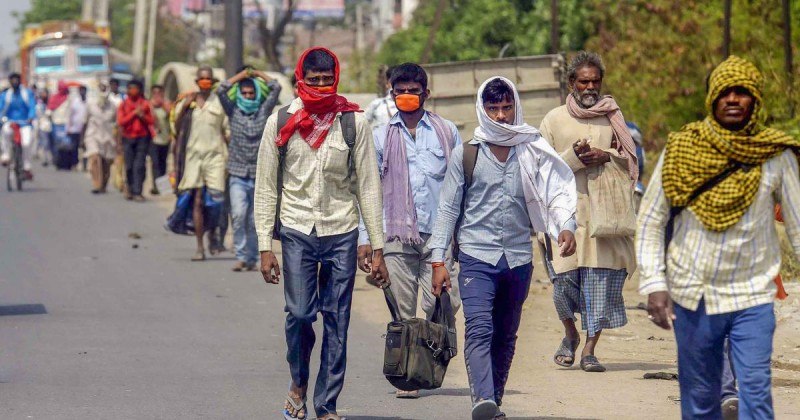Possibly, our degeneration is complete. We are toxic. We love to be violent. Religion, for us, is a sword of hatred. And we refuse to learn anything from what caused the trauma of partition– dividing people on the basis of religion, arousing the mass psychology of hatred, activating the brute instincts, and making the Hindus and Muslims think that they are destined to fight, and never can they live together.
The Anatomy of a Speech
No wonder, as the elections approach, the loud speeches delivered by some of our key politicians have begun to indicate a design: make people forget the issues that affect them–health, education and employment, and make them derive tremendous pleasure in demonizing the ‘enemy’ and stigmatizing the ‘problematic’ minority.
In fact, at times I wonder what the likes of Gandhi and Manto would have thought had they listened to Mr. Narendra Modi’s recent election speech at Wardah. Possibly, they would have shed tears, and felt that nothing matters to the ‘successful’ political class except the instrumental urge to win the elections at any cost. Communalism, hate speeches, Hindu-Muslim division, catchy rhetoric, non-reflexive/loud emotions: everything is possible; and even the Prime Minister of the country doesn’t mind losing the grace of the position.
Well, Rahul Gandhi, we know, is not a saint; and it is possible to say that he is not free from the calculative logic of the electoral politics. But then, see Mr. Modi’s language: ‘Rahul Gandhi is running away from majority-dominated areas to take refuge in areas where the majority is in minority’. The reason, according to Mr. Modi, is that by coining the term ‘Hindu terror’, the Congress has ‘tainted the fundamental ethos’ of the country; and hence, it knows that ‘it will never be forgiven for this sin’. In other words, the message that Mr. Modi is conveying is that Mr. Rahul Gandhi can’t face the Hindu community, and hence he has decided to contest from Wayanad in Kerala – a Muslim-dominated constituency.
What does one derive from this speech? First, Hindus are necessarily always innocent, peaceful and lovable, whereas it is possible to equate Islam with violence and terrorism. ‘Good’ Hindus are suffering because there are ‘bad’ Muslims – terrorists and enemies of the nation – who conspire. Second, we are divided; the walls of separation have been erected; and there is nothing common amongst us. We are caught into the dialectic of the ‘majority’ vs ‘minority’. And third, whereas the BJP understands the ‘agony’ and ‘helplessness’ of the Hindus because of the ‘threat’ posed by the ‘minority’ community, Mr. Rahul Gandhi or the Congress is potentially a ‘pro-Muslim’ party, and hence it is dangerous.
This is a frightening speech. Hindus are innocent; Muslims are typified as conspirators; and the only legitimate form of nationalism is ‘Hindu nationalism’. We have no class; we have no gender; we have no caste; we have no autonomous agency. Instead, we are either ‘good’ Hindus or ‘bad’ Muslims. We should not think of anything else.
Communalism is Authoritarianism
Who am I? With this question I begin to look at myself. Yes, it is possible to say that I am a Hindu; and because of my socialization I am familiar with ,say, a set of Hindu festivals and rituals; or, for that matter, I have grown up by hearing the stories from the puranas and the epics; and eventually, I have been introduced to the Bhagavadgita and the Upanishads. Possibly, as a Hindu, I also see my difference with a Muslim or a Christian as far as the specifities of rituals and festivities are concerned. But then, far from seeing these differences as psychic hindrances, I feel that differences are normal and symmetrical, and the art of living is essentially an acknowledgement of this plurality.
Moreover, my ‘Hindu’ identity is only a fragment of my being. I have an awareness of class and gender. And I know that in this oceanic universe there are many currents–say, the tales of Jesus and Rumi, the political philosophies of Marx and Gandhi, and the literary sensibilities of Dostoyevsky and Tagore – that have affected me. In other words, I am not merely a ‘Hindu’. I do feel that the essential spirit of religiosity – the spirit of wonder, constant reflection on the meaning of life and death, and quest for transcendence – is beyond the fixed categories of ‘Hindu’, ‘Muslim’ and ‘Christian’. In the curved trajectory of life we are all wanderers, even if the priest-craft or the clergy wants to divide us, and confine us to the burden of ritualism.
Likewise, as I open my eyes, and become an alert observer, i realize that there is nothing called ‘homogeneized’ Hinduism. Hence, I know that there are ‘Hindu’ men who torture their ‘Hindu’ wives; there are ‘Hindu’ capitalists who exploit ‘Hindu’ workers; and there are ‘Hindu’ bureaucrats and traders engaged in an act of corruption, and cause trouble to subaltern ‘Hindus’.
Likewise, I know that there is nothing called a ‘standardized Muslim’. As I move around the lanes of Old Delhi, I see the wealthy ‘Muslim’ no less indifferent to the ‘Muslim’ beggars near the Jama Masjid. How is it possible to forget that caste and class, and gender and status affect the dynamics of social interactions?
Likewise, I know that there are shared domains. My ‘Muslim’ students, for instance, are not fundamentally different from my ‘Hindu’ students; the issues relating to fellowships, publications and academic positions affect them equally. And possibly, a ‘Muslim’ Ph.D student feels more affinity with a ‘Hindu’ friend in the university cafeteria rather than a ‘Muslim’ clergy at Saharanpur. Yes, we share the world. And the walls of separation are often broken.
Why is it that the political class–and particularly, those who sell religion as an ‘identity’–wants to divide us? One obvious answer is that this is the most effective way to diminish the significance of the real issues that affect us, irrespective of the religions we adhere to. Suppose, I am poor. I can’t send my child to a good school because I can’t afford it. My mother is sick. The nearby government hospital is dirty and over-crowded. But I cannot take her to a private super specialty hospital because I have no medical insurance. But then, the proponents of communal politics would make me believe that for everything the Muslims are responsible, and if we can send them back to Pakistan everything will be in order. However, the fact is that like me, poor Muslims too are experiencing the similar problem. However, we will be driven to destroy each other; and meanwhile, the Adanis and the Ambanis will do their business, and socio-economic inequality would continue to be reproduced. The issues of common concern–social security, distributive justice and livelihood opportunities–will be forgotten. In fact, without critically nuanced sane voices from the religious communities, it is really difficult to come out of this trap of false consciousness.
The other answer is that sensationalism, toxic messages and the notion of an ‘enemy’ tend to stimulate the crowd mentality or the mass psychology of hatred. Gandhi walking through Noakhali to restore peace and harmony, Marx urging the working class to unite, Tagore reminding us of the danger of militant nationalism, Manto writing about the brutality of communal violence–everything has begun to look ‘boring’; what matters is a straight and simple narrative that requires no thinking : hate Pakistan, hate the Muslims, suppress the voices of all dissenters, and prove your nationalism by hating and finishing your ‘enemies’. It excites. It is gross. It is addictive. Those who are used to the noise of loud music would find Bhimsen Joshi or Bismilla Khan boring. Likewise, if you are used to the kind of speeches Mr. Modi or his lieutenant Mr. Amit Shah is making, you would ridicule and love to kill the likes of Mahatma Gandhi time and again.
Yes, communalism is authoritarianism. And this mix of communalism, authoritarianism and crony capitalism is destroying the spirit of democracy -the possibility of a cross-cultural dialogic space. Well, we will exercise the voting power. But then, is it possible not to get carried away by Mr. Modi’s ‘oratory’, and see the world with critical thinking and spiritual wisdom?
You and I have to decide.
This article is part of democracy4you campaign.





